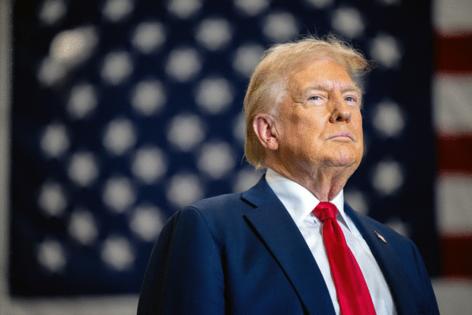Clive Crook: Trump offers voters a trifecta of economic madness
Published in Op Eds
In judging Donald Trump’s policy pronouncements, voters are advised to take the former president “seriously but not literally.” There’s rarely much choice, given that so many of his promises, taken literally, are unintelligible. Yet the former president has made commitments on economic policy that are not only intelligible but might also be actionable – that is, they’d fall (arguably) within his powers as chief executive.
Taking such pledges both literally and seriously is hardly frivolous. Given the closeness of the race, it’s a disturbing exercise. Whether he knows it or not, Trump is promising to cripple the U.S. economy.
Start with trade. Bloomberg Economics has run the numbers on his proposal to put a 60% tariff on imports from China and 20% on products from other countries. A jolt of this magnitude is hard to assess, because it’s uncharted terrain. (The trade restrictions of Trump’s first term pale by comparison; even the Smoot-Hawley tariffs of 1930 were milder.) Using the World Trade Organization’s model of global trade, the study finds that U.S. imports would drop by between 40% if only China retaliated with higher barriers and 55% if other trade partners retaliated too.
Some U.S. producers, shielded from foreign competition, would gain. Export-oriented sectors would lose –and so would consumers in the aggregate. The net effect is unambiguously large and negative. The policy delivers a forceful supply-side shock, sufficient to cut U.S. output in 2028 by between 0.8% and 1.3%, and employment by between 0.4% and 0.7%. Prices would be 4% higher if only China retaliated; just 0.5% supposing wider retaliation (the extra deflation keeps prices in check).
There’s more. This self-wounding trade shock is just one element in Trump’s strategy for putting foreigners in their place. Warwick McKibbin, Megan Hogan and Marcus Noland of the Peterson Institute for International Economics, using another global model, have simulated the effects of new trade restrictions together with the promised deportation of unauthorized immigrant workers and moves to curb the independence of the Federal Reserve (with a view to keeping interest rates low and the dollar cheap).
Call it a trifecta of economic idiocy. It would cut U.S. output in 2028, says the PIIE study, by between 2.8% and 9.7%. Employment would be lower by roughly the same margin. And instead of running at roughly 2%, as assumed in the simulation’s baseline, inflation would peak in 2026 at between 6% and 9.3%; it wouldn’t get much below 4% through 2040.
The PIIE’s economists assume U.S. tariffs rise to 60% for China and 10% for the rest of the world (not 20% as assumed by Bloomberg Economics; Trump has mentioned both numbers). The ranges in their estimates depend on assumptions about trade-policy retaliation and the scale of promised deportations. The least-damage case assumes domestic tariffs, no retaliation, 1.3 million deportations and a compromised Fed; the greatest-damage case assumes the same on domestic tariffs and the Fed, plus trade retaliation and 8.3 million deportations. (The Republican Party platform proposes a deportation scheme modelled on the Eisenhower administration’s “Operation Wetback,” which ejected 1.3 million people; 8.3 million is an estimate of the total number of unauthorized immigrant workers.)
All three of these policies – tariffs, deportations and undermining central-bank independence – are individually harmful. Tariffs act as a supply-side shock. Deportations shrink both aggregate supply and aggregate demand. (Desirable as it might be to repair the country’s dysfunctional immigration rules, unauthorized immigrants still add to the labor force, demand goods and services, and contribute to the public purse.) And pressuring the Fed to keep interest rates low to spur growth would come at the cost of higher inflation, higher risk premiums on U.S. assets, capital outflows and lower investment – hence, in due course, lower not higher output. Once combined, the negative effects of the three proposals are compounded.
The trifecta is by no means a worst-case Trump scenario. It doesn’t factor in his fiscal recklessness. His tax proposals include extending the soon-to-expire provisions of the 2017 Tax Cuts and Jobs Act; eliminating taxes on Social Security, overtime pay and tip income; lowering the corporate tax rate to 15% for companies that make their products in the U.S.; and more. The revenue gained from tariffs, though substantial, wouldn’t come close to meeting the cost, so Trump’s plans would add substantially to a budget deficit that’s already dangerously big. Yet note one crucial point: He would need Congress to go along with these broader fiscal plans. As president, he could plausibly raise trade barriers, deport unauthorized immigrants and lean on the Fed, all at his own initiative.
Who knows what he would do? Most likely, Trump himself has no clue. But voters should take his economic promises both literally and very, very seriously.
_____
This column does not necessarily reflect the opinion of the editorial board or Bloomberg LP and its owners.
Clive Crook is a Bloomberg Opinion columnist and member of the editorial board covering economics. Previously, he was deputy editor of the Economist and chief Washington commentator for the Financial Times.
_____
©2024 Bloomberg L.P. Visit bloomberg.com/opinion. Distributed by Tribune Content Agency, LLC.




























































Comments